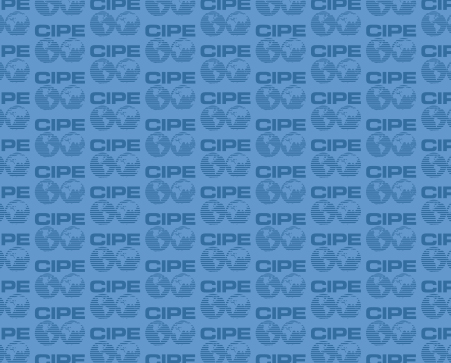
In today’s world of polarized politics, divisions within societies struggling with the history of divisions feel particularly deep. Countries emerging from conflict, such as Colombia or South Sudan, are striving to make progress toward non-violence and reconciliation. Even in peaceful, mature democracies, the public discourse has become more partisan and polarized than ever. As countries look for transformative leadership to overcome divisions, they struggle with building effective coalitions that could overcome differences and find consensus in key areas.
In this context, the 2017 Global Leadership Forum, focused on “Building Leadership for Reform in Divided Societies” and hosted by the World Bank in Washington, DC, came at a very opportune time. The event brought together about 200 partners, leaders and practitioners from government, academia, civil society, and international development organizations working on collaborative leadership. I had the privilege of representing CIPE as one of the members of the Global Partnership on Collaborative Leadership for Development (GPCL4D).
The Forum is the second in a series of events organized by the GPCL4D that puts leadership and coalitions at the center of international development. The discussion and exchange of practical approaches built on the lessons from last year. My main takeaways this time revolve around four key ideas:
- Conflict is not necessarily bad if managed properly.In international development, conflict is usually narrowly equated with violence. Yet, conflict has a broader and more universal meaning – disagreement, clash of ideas, difference of opinion. In that sense, it is a fundamental and unavoidable part of a human condition. The key question is: how to manage disagreements so that they lead to constructive progress rather than a destructive downward spiral? Inclusive democracy is the best way we have to reconcile competing interests and arrive at joint solutions.
- Resolving conflict is about trust. Trust has been a word uttered frequently during the Forum. Indeed, without trusting the other side it is difficult to make concessions and come up with a compromise. Still, in many situations that level of trust is hard to find given painful histories of (sometimes bloody) conflict. In these cases, it is crucial to create mechanisms that make trust in the process possible even if the parties at the table do not necessarily trust each other. This approach has been successfully used in Colombia’s peace negotiations, for instance.
- Toxic leaders are not monolithic. All too often, public-private dialogue over a policy issue falls apart with one side accusing the other of toxic behavior – a combination of self-centered attitudes, motivations, and actions. Nonetheless, it is important to seek common ground even with the most uncooperative leaders. They may not be equally intransigent on all issues. Their views may also evolve over time as circumstances change, especially if they face a well-organized coalition of stakeholders who speak in one voice on an important issue. We have seen this approach work in a number of countries where the private sector managed to constructively engage with otherwise uncooperative governments.
- Technocratic solutions are not enough. When approaching a situation of conflict, donors often bring to the table solutions based on international best practices and objective prescriptions. These can be useful elements of the conversation that steer it in a positive direction. However, it is unrealistic to expect that the technocratic solution will be simply accepted on its merits by parties that deeply disagree and often distrust each other. They must first develop a mindset open to new ideas and compromise. The key role of a donor as a good mediator is to help the conflicted parties cultivate this mindset, not just to recommend even the soundest of solutions.
I thoroughly enjoyed the 2017 Forum, which provided a unique opportunity for practitioners to interact and share lessons learned. For those who were unable to attend, the sessions are available online, and more information about the GPCL4D can be found on its website throughout the year.
Anna Kompanek is Director of Multiregional Programs at CIPE.
Published Date: March 15, 2017